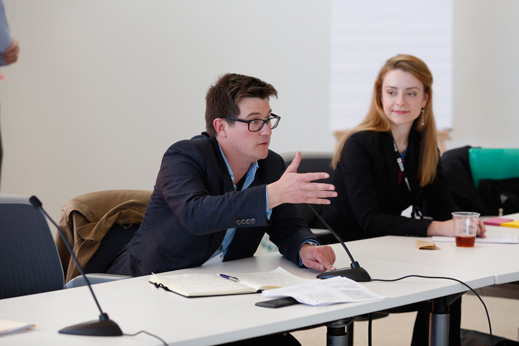White House Strikes a Blow for Advanced Nuclear Reactors
Acknowledging a groundswell of startup companies developing advanced nuclear reactors, the U.S. Department of Energy has announced a new program to help facilitate and finance innovation in nuclear power. Called the Gateway for Accelerated Innovation in Nuclear, the program will “provide the nuclear energy community with access to the technical, regulatory, and financial support necessary to move new or advanced nuclear reactor designs toward commercialization.”

There are nearly 50 companies in North America working on advanced nuclear reactor technologies, backed by more than $1.3 billion in private capital, according to Third Way, a Washington, D.C.-based research organization focused on energy, climate change, and national security (see “Experiments Start on a Meltdown-Proof Nuclear Reactor” and “Advanced Reactor Gets Closer to Reality”). But a lack of support from the DOE and an expensive, time-consuming licensing process under the Nuclear Regulatory Commission have presented hurdles that are all but insurmountable for startups (see “Advanced Nuclear Industry to Regulators: Give Us a Chance”).
The Gateway program, announced at the Summit on Nuclear Energy held last week at the White House, is the clearest signal to date of the Obama administration’s support for new nuclear technology. The DOE also announced it would broaden its $12.5 billion loan guarantee program for innovative nuclear technologies. These initiatives will give advanced nuclear companies access to the national laboratories, a single point of contact for collaboration with DOE experts, and help in “understanding and navigating the regulatory process for licensing new reactor technology.”
“The DOE knows that there’s a large and growing sector of advanced reactor design companies,” says Leslie Dewan, the cofounder of Transatomic Power, which is developing a novel liquid-fuel reactor concept, “and they’ve put together concrete, extremely helpful ways to work with us to move the field forward here in the U.S.”
As part of the program, companies will now be able to use DOE loan guarantees to help cover the cost of NRC licensing, including design certification, construction permits, and the necessary licenses—costs that could total in the millions of dollars.
Also, the DOE is launching a small-business voucher system to enable startups to use national lab facilities. Noting that the voucher scheme will divide a total of $2 million among all the successful applicants, some in the advanced nuclear community were less than thrilled with the plan.
“It’s much better than a sharp stick in the eye,” says John Kutsch, the director of business development at nuclear startup Terrestrial Energy, “but it’s still a small level of commitment when compared to the amount of service and money going to so-called renewables, or the amount that China has committed to advanced nuclear.”
Keep Reading
Most Popular
Large language models can do jaw-dropping things. But nobody knows exactly why.
And that's a problem. Figuring it out is one of the biggest scientific puzzles of our time and a crucial step towards controlling more powerful future models.
How scientists traced a mysterious covid case back to six toilets
When wastewater surveillance turns into a hunt for a single infected individual, the ethics get tricky.
The problem with plug-in hybrids? Their drivers.
Plug-in hybrids are often sold as a transition to EVs, but new data from Europe shows we’re still underestimating the emissions they produce.
Google DeepMind’s new generative model makes Super Mario–like games from scratch
Genie learns how to control games by watching hours and hours of video. It could help train next-gen robots too.
Stay connected
Get the latest updates from
MIT Technology Review
Discover special offers, top stories, upcoming events, and more.